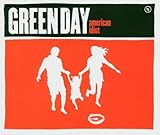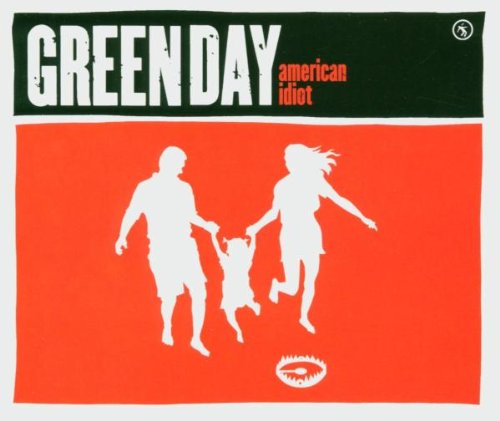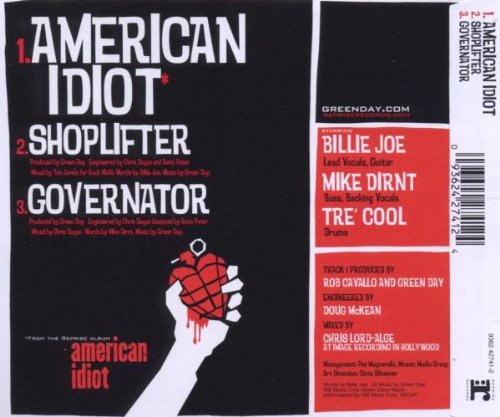Green Day Album: «American Idiot»

- Customers rating: (4.0 of 5)
- Title:American Idiot
- Release date:2004-09-20
- Type:Audio CD
- Label:Wea/Warner
- UPC:093624274124
- Average (4.0 of 5)(2205 votes)
- .1359 votes
- .265 votes
- .115 votes
- .104 votes
- .362 votes
For those of you who are unaware that this is a rock opera, let me fill you in.
My take on the album:
American Idiot: An introduction to the setting and mood of the story; describes the current way of life in America and the issues some have with it.
Jesus of Suburbia:
I. Jesus of Suburbia: We are introduced to the main character, "Jesus of Suburbia," so named because he's a typical suburban kid (there's nothing wrong with me, this is how i'm supposed to be): his parents are divorced, he sits around watching TV, and experiments with drugs. He feels an emptiness in his life.
II. City of the Damned: Jesus' discontentment grows as he realizes the apathy of those surrounding him.
III. I Don't Care: Jesus sees how widespread people's indifference is.
IV. Dearly Beloved: Jesus notes the effect of this indifference on his own personal relationships.
V. Tales of Another Broken Home: Fed up to the point of breaking, Jesus leaves home in search of meaning and a purpose in his life.
Holiday: Jesus meditates on the problems with modern American government and society as he wanders the streets of the city to which he has run away.
Boulevard of Broken Dreams: Jesus laments his lonliness in this new place. This song hints at the upcoming emergence of St. Jimmy (I'm walking down the line that divides me somewhere in my mind).
Are We the Waiting: Still alone, Jesus wonders what will become of him. He comes to reject his identity (the Jesus of Suburbia is a lie) and decides to create a new one, leading to...
St. Jimmy: The introduction of "St. Jimmy," the punk street kid personality that Jesus invents to go along with his new life. This persona rejects the cushy suburban life led by Jesus; Jimmy is a violent, drug dealing, melevolant criminal. As Jimmy, he falls in with a crowd of like-minded youth in the city.
Give Me Novocaine: In accordance with his new personality, Jesus/Jimmy becomes increasingly reliant on drugs.
She's a Rebel: The introduction of "Whatsername," an anarchist/punk girl that Jimmy meets and falls in love with. Her nonconformist ideals appeal greatly to Jimmy.
Extraordinary Girl: Deals with Jimmy's frustration with his inability to express his true feelings for Whatsername, as well as the sadness and lonliness hidden underneath Whatsername's outwardly tough persona (she sees the mirror of herself, an image she wants to sell to anyone willing to buy ... she's all alone again, wiping the tears from her eyes).
Letterbomb: Perhaps the most complex and important song on the album, as far as the story is concerned. Jimmy's new life and the lives of his new friends settle down into a kind of boring monotony, much like Jimmy's old life as Jesus of Suburbia. Whatsername, however, still longs for the unbridled anarchy (Where have all the b******* gone? ... Where have all the riots gone?). She's become as disillusioned with her current life as Jesus was with his at the beginning of the story. She harshly criticizes Jimmy, telling him--possibly via writing a letter, which would explain the song's title--that his new personality is just as empty as his old one, and neither is his true self (You're not the Jesus of Suburbia, the St. Jimmy is a figment of your father's rage and your mother's love). Fed up, much like Jesus was at the beginning of the story, Whatsername leaves town, leaving Jesus/Jimmy behind.
Wake Me Up When September Ends: Jesus/Jimmy is alone again and depressed about Whatsername's decision to leave.
Homecoming:
I. The Death of St. Jimmy: A conflict between the character's two personalities in his own mind. It ends with the destruction of the "Jimmy" personality (Jimmy died today, he blew his brains out into the bay. In this state of mind is my own private suicide).
II. East 12th St.: The Jesus persona is back, and leading the same kind of empty existence he fled from previously. He holds a boring job (Jesus filling out paperwork now at the facility on East 12th Street). He once again longs to escape, but remains stuck where he is.
III. Nobody Likes You: Overcome once more with loneliness, Jesus sits alone and feels sorry for himself.
IV. Rock and Roll Girlfriend: Once more longing to break free, Jesus has a midlife crisis and goes through a wild, "rock and roll" binge phase.
V. We're Coming Home Again: Unable to find meaning in anything, Jesus returns to his boring, middle class suburban life (their time has come and it's gone nowhere, nobody ever said that life was fair). Basically, Jesus ends up right back where he started, older but not much wiser, unable to find the fulfillment and meaning in his life that he went searching for so long ago. However, even though the character basically ends up as the kind of "loser" he always wanted to avoid becoming, he does find some kind of comfort in returning to his original empty existence.
Whatsername: After all is said and done, Jesus looks back at his life and wonders if Whatsername ever found the fulfillment he was never able to. Although he laments the fact that they did not end up together, and will likely always see her as "the one that got away" (there are strong indications that he misses her more for what she represented than for who she was, but it seems obvious that he does miss her: the regrets are useless, in my mind, she's in my head, i must confess), he takes comfort in remembering the times they shared.
Well, that's just my interpretation of the story. It's probably not entirely right, and perhaps it's completely wrong, but it's what I got out of the lyrics. For what it's worth, I found it to be a compelling and satisfying story.
For those of you that are currently unaware, "American Idiot" is a rock opera and a concept album, much like The Who's "Tommy" or Pink Floyd's "The Wall."
My take on the album:
American Idiot: An introduction to the setting and mood of the story; describes the current way of life in America and the issues some have with it.
Jesus of Suburbia:
I. Jesus of Suburbia: We are introduced to the main character, "Jesus of Suburbia," so named because he's a typical suburban kid (there's nothing wrong with me, this is how i'm supposed to be): his parents are divorced, he sits around watching TV, and experiments with drugs. He feels an emptiness in his life.
II. City of the Damned: Jesus' discontentment grows as he realizes the apathy of those surrounding him.
III. I Don't Care: Jesus sees how widespread people's indifference is.
IV. Dearly Beloved: Jesus notes the effect of this indifference on his own personal relationships.
V. Tales of Another Broken Home: Fed up to the point of breaking, Jesus leaves home in search of meaning and a purpose in his life.
Holiday: Jesus meditates on the problems with modern American government and society as he wanders the streets of the city to which he has run away.
Boulevard of Broken Dreams: Jesus laments his lonliness in this new place. This song hints at the upcoming emergence of St. Jimmy (I'm walking down the line that divides me somewhere in my mind).
Are We the Waiting: Still alone, Jesus wonders what will become of him. He comes to reject his identity (the Jesus of Suburbia is a lie) and decides to create a new one, leading to...
St. Jimmy: The introduction of "St. Jimmy," the punk street kid personality that Jesus invents to go along with his new life. This persona rejects the cushy suburban life led by Jesus; Jimmy is a violent, drug dealing, melevolant criminal. As Jimmy, he falls in with a crowd of like-minded youth in the city.
Give Me Novocaine: In accordance with his new personality, Jesus/Jimmy becomes increasingly reliant on drugs.
She's a Rebel: The introduction of "Whatsername," an anarchist/punk girl that Jimmy meets and falls in love with. Her nonconformist ideals appeal greatly to Jimmy.
Extraordinary Girl: Deals with Jimmy's frustration with his inability to express his true feelings for Whatsername, as well as the sadness and lonliness hidden underneath Whatsername's outwardly tough persona (she sees the mirror of herself, an image she wants to sell to anyone willing to buy ... she's all alone again, wiping the tears from her eyes).
Letterbomb: Perhaps the most complex and important song on the album, as far as the story is concerned. Jimmy's new life and the lives of his new friends settle down into a kind of boring monotony, much like Jimmy's old life as Jesus of Suburbia. Whatsername, however, still longs for the unbridled anarchy (Where have all the b******* gone? ... Where have all the riots gone?). She's become as disillusioned with her current life as Jesus was with his at the beginning of the story. She harshly criticizes Jimmy, telling him--possibly via writing a letter, which would explain the song's title--that his new personality is just as empty as his old one, and neither is his true self (You're not the Jesus of Suburbia, the St. Jimmy is a figment of your father's rage and your mother's love). Fed up, much like Jesus was at the beginning of the story, Whatsername leaves town, leaving Jesus/Jimmy behind.
Wake Me Up When September Ends: Jesus/Jimmy is alone again and depressed about Whatsername's decision to leave.
Homecoming:
I. The Death of St. Jimmy: A conflict between the character's two personalities in his own mind. It ends with the destruction of the "Jimmy" personality (Jimmy died today, he blew his brains out into the bay. In this state of mind is my own private suicide).
II. East 12th St.: The Jesus persona is back, and leading the same kind of empty existence he fled from previously. He holds a boring job (Jesus filling out paperwork now at the facility on East 12th Street). He once again longs to escape, but remains stuck where he is.
III. Nobody Likes You: Overcome once more with loneliness, Jesus sits alone and feels sorry for himself.
IV. Rock and Roll Girlfriend: Once more longing to break free, Jesus has a midlife crisis and goes through a wild, "rock and roll" binge phase.
V. We're Coming Home Again: Unable to find meaning in anything, Jesus returns to his boring, middle class suburban life (their time has come and it's gone nowhere, nobody ever said that life was fair). Basically, Jesus ends up right back where he started, older but not much wiser, unable to find the fulfillment and meaning in his life that he went searching for so long ago. However, even though the character basically ends up as the kind of "loser" he always wanted to avoid becoming, he does find some kind of comfort in returning to his original empty existence.
Whatsername: After all is said and done, Jesus looks back at his life and wonders if Whatsername ever found the fulfillment he was never able to. Although he laments the fact that they did not end up together, and will likely always see her as "the one that got away" (there are strong indications that he misses her more for what she represented than for who she was, but it seems obvious that he does miss her: the regrets are useless, in my mind, she's in my head, i must confess), he takes comfort in remembering the times they shared.
Well, that's just my interpretation of the story. It's probably not entirely right or perhaps it's completely wrong, but it's what I got out of the lyrics. For what it's worth, I found it to be a compelling and satisfying story.
If you are wondering if this is edited it isn't. This is just the version they sell in Europe ( In Europe they don't have to put warnings on cd's for bad lyrics.)
First of all, I've been listening to Green Day since the time before Dookie and didn't like the last couple of albums...
American Idiot is one of the worst songs on this album and it's a pretty good song. If you're basing your decision on whether or not to buy this album based on that song, you're making a big mistake.
Jesus of Suburbia, Holiday, and Boulevard of Broken Dreams are all completely different songs and take a different approach from their previous albums. Is this album less "punk" than their older stuff? Yes, it is. But, if you want to hear songs like Dookie, listen to Dookie. Get upset with a band when they take a step backward, not when they take a huge step forward and put out an album like this.
Call it maturing, artistic growth, whatever else you want to call it. This band has changed and it's a change for the better. I was a little hesitant to buy it but it was on sale so I picked it up 6 days ago with some other albums. I decided to listen to it first and I haven't listened to anything else since then. I haven't even listened to the other stuff I bought last week. This album is that good and everyone I know that has listened to it agrees with me.
Yes, that's right. I think this CD is actually better than Dookie. And not by a hair, or a smidge. I genuinely think this is Green Day's greatest. I mean, there are thirteen solid tracks, 21 songs, of some of the best if not THE best songs Green Day has ever written, and they've been arranged into a full on three act opera, making them that much better. Also, given the times, this CD may also have more social significance than Dookie did. Dookie brought Punk into the mainstream, but this CD may do so much more. Yes, this CD attacks our president (and rightfully so), but it is also an attack on the apathetic suburbia that let him rise to power, not to mention stand by as people like Jesus of Suburbia live harsh daily realities that they can only run away from but are doomed to return to. The story itself starts on President's Day and ends some twenty years later where, after finding his confidence in and ultimately destroying his alter ego St. Jimmy and surviving (probably not by choice) his relationship with the rebellious and insightful Whatsername, Jesus of Suburbia is left alone and looking back on what could have been. Musically, this is also Green Day's most, diverse and ambitious record ever. "Holiday" recalls the mid tempo roll of The Clash. My personal favorite "Boulevard of Broken Dreams" channels all that is good and melodic (which, I realize, isn't always much) about emo music. Songs like "St. Jimmy" and "She's a Rebel" recall the fast power chords that made Green Day famous. "Wake Me Up..." may be the most melodic, sombre, beautiful song they've ever penned, save "Good Riddance." The nine minute songs are also sheer brilliance as each new part just seems to build on the one before it, with "Homecoming" bursting in the end with the (by this point in the record) anthemic "Nobody Likes You/Everyone Left You/They're All out without you/Having fun!" Whatsername is the falling action of a third act, being the perfect closer to this album. There are just no weak points on this album. There is no filler. When the energy is high, it is really high. When this record is mellow, it is really mellow. This record is dynamic. It is meaningful. It is flawless. It is Green Day's masterwork.


